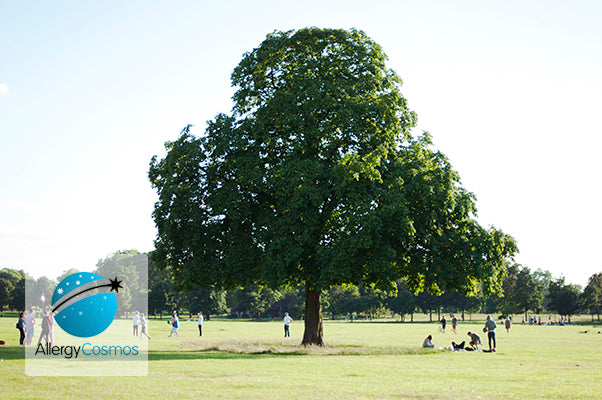Hay fever in March tends brings on the following symptoms:
- Sneezing
- A runny nose
- Blocked nose
- Red, streaming eyes
So if you experience these symptoms, then it is likely that you have seasonal allergic rhinitis - also known as hay fever. Having Hay Fever means that you are likely allergic to pollen and, at this time of the year, it is most likely that tree pollen is the underlying cause. The tiny pollen grains contain specific proteins which the immune system of an allergic person over-reacts to. If the symptoms are present all year round, then it is perennial allergic rhinitis caused by a non-pollen allergen.
What causes my hay fever in March?
Hay fever/rhinitis is inflammation of the nasal passages and it has many causes, the most common reason for hay fever in march is an allergy to a substance like pollen, house dust mite or pet dander. In the case of hay fever, the problem allergen is pollen from trees, grasses or weeds. If your hay fever symptoms occur in March (maybe clearing up within a few weeks) then it is most likely that you are allergic to pollen from a tree. Hay fever later in the year is caused by grass pollen (Spring, Summer) or weed pollen (Summer, Autumn).
The tree pollen season lasts from early January to late April, with each tree species producing its pollen for three to four weeks in all. The following tree species (in the order in which their pollen appears) are known to cause hay fever in March in the UK are:
- Hazel
- Alder
- Poplar
- Ash
- Birch
- Oak
The exact time of year when particular tree pollen is around depends on winter weather, the location of the tree, hours of sunshine in the day and temperature. Pollen from trees, grasses and weeds is carried around by the wind (unlike pollen from flowering plants, which is carried by insects and far less likely to cause an allergy problem). That is why it is present in the air. Pollen grains are very small (between 10 to 40 microns in size). They can be carried through great distances so you might not even need to be in the presence of trees to experience hay fever symptoms. Moreover, the tree pollen can break up into even tinier fragments which remain airborne for longer.
What can I do about Hay Fever in March?
The symptoms of hay fever in March can interfere with work, sleep, study and social life and, if they are severe, it is worth asking your doctor to refer you for skin prick or blood tests to pinpoint your allergen, so you can work towards avoiding it.
It is certainly possible to reduce your exposure to tree pollen by adopting the following tips.
Indoors. Pollen grains tend to settle and not remain airborne for too long, so focus on not letting pollen indoors.
- Use an allergy air purifier to effectively capture pollen from the air
- Don't dry clothes outside during the pollen season, as they will collect up pollen grains and bring them inside.
- Similarly, change your clothes and wash your hair when you come in from work.
- Clean your home with Allergy & Asthma Free Home Package of cleaning products
- Brush pets thoroughly when they come indoors (or keep them outside) to remove the pollen that clings to their fur. Wash them with Allergy Pet Shampoo PET+
- Keep windows and doors shut during peak pollen times.
Outdoors.
- Check the pollen forecast. The following sites give good information: http://www.metoffice.gov.uk/health/public/pollen-forecast and http://www.worcester.ac.uk/discover/pollen-forecast.html. Plan your activities accordingly.
- Use a car air purifier to capture pollen and other pollutants.
- Use a face mask when you cycle and wrap a scarf over your nose when you walk at peak pollen times.
It will not be possible to avoid all pollen entirely so it might also be necessary to have some medication on hand. The new generation non-sedating antihistamines (like Claritin) are very useful against the symptoms of hay fever because they block the action of histamine. You may find short-term use of a decongestant helpful as well. Most hay fever medications are available over the counter these days. Always read the label and, if you have questions, do ask the pharmacist about the medication.




